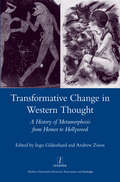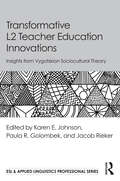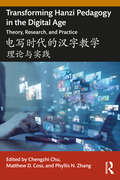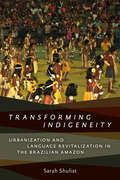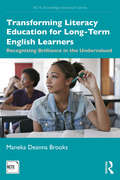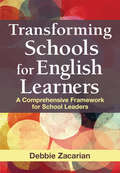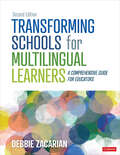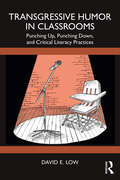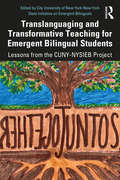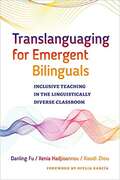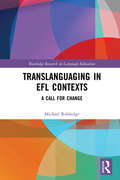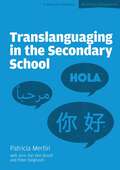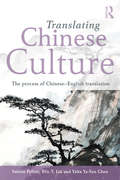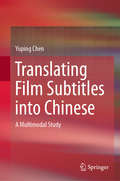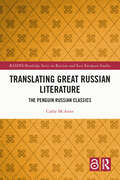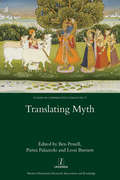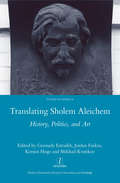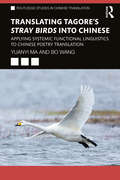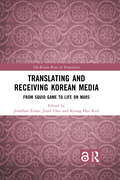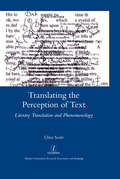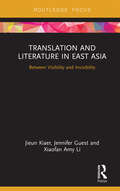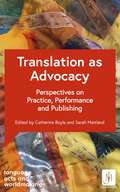- Table View
- List View
Transformative Change in Western Thought: A History of Metamorphosis from Homer to Hollywood
by Ingo GildenhardThis groundbreaking volume maps the shifting place and function of marvelous transformations from antiquity to the present day. Shape-shifting, taking animal bodies, miracles, transubstantiation, alchemy, and mutation recur and echo throughout ancient and modern writing and thinking and continue in science fiction today as tales of gene-splicing and hybridisation. The idea of metamorphosis lies in uneasy coexistence with orderly world views and it is often cast out, or attributed to enemies. Augustine and the church fathers consider shape-shifting ungodly; Enlightenment thinkers suppress alchemy as unscientific; genetically-modified wheat and stem-cell research are stigmatised as unnatural. Yet the very possibility of radical transformation inspires hope just as it frightens. A provocative, theorising, trans-historical history, this book ranges across classics, literature, history, philosophy, theology and anthropology. From Homer and Ovid to Proust and H. P. Lovecraft and through figures from Proteus to Kafka's Fly and toSpiderman, four historical surveys are combined with nine case studies to show the malleable, yet persistent, presence of transformation throughout Western cultural history.
Transformative L2 Teacher Education Innovations: Insights from Vygotskian Sociocultural Theory (ESL & Applied Linguistics Professional Series)
by Karen E. Johnson Paula R. Golombek Jacob RiekerTransformative L2 Teacher Education Innovations features empirical research studies informed by Vygotskian Sociocultural Theory (VSCT) that are explicitly and intentionally designed to transform second language (L2) teacher reasoning and thinking, as well as L2 teaching practices and pedagogical choices.With contributions from scholars and practicing teacher educators, each chapter highlights a designed innovative professional development experience that has created a “new” social situation of development with a clearly articulated “ideal” for L2 teachers to embrace and/or achieve. Each study articulates the rationale and unique design features of the innovation, the intentionality behind the choices made when designing and enacting the innovation, and the quality, character, and outcomes of the intervention for L2 teachers. Furthermore, each study documents the forms of mediation that are offered to support L2 teacher professional development, such as conceptual tools, goal-directed activities, and/or social relations/interactions.The book offers insight into the internal logic of VSCT-informed L2 Teacher Education and provides concrete examples of how L2 teacher educators can adopt a Vygotskian-informed pedagogical stance in their teacher education practices. The edited collection is especially applicable for scholars and teacher educators in language education, applied linguistics, TESOL, and bilingual education who engage with Vygotskian Sociocultural Theory.
Transforming Hanzi Pedagogy in the Digital Age: 电写时代的汉字教学: 理论与实践
by Chengzhi Chu Matthew D. Coss Phyllis N. ZhangTransforming Hanzi Pedagogy in the Digital Age 电写时代的汉字教学 brings together expert researchers and practitioners to offer a coherent theoretical, empirical, pedagogical, and experiential justification for a shift in pedagogical focus from handwriting to e-writing in L2 Chinese pedagogy.This volume argues for a pedagogy based on the 21st century communicative needs of L2 Chinese users, grounded in empirical research as well as practical and lived experiences. The authors propose an “e-writing as primary” (电写为主,手写为辅) framework for L2 Chinese instruction in the 21st century, a transformational proposal which will fundamentally shift the pedagogical focus of L2 Chinese instruction globally towards more learner-centered, research-informed practice. This volume includes three theoretical foundation chapters, four empirical studies, three descriptions of program-level implementation, and ten expert L2 Chinese user vignettes, which, taken together, offer a thorough introduction to e-writing for the future of L2 Chinese teaching and learning.This book will be informative for Chinese language instructors, researchers, program directors, materials developers, and advanced graduate students in both CFL and CSL contexts worldwide.
Transforming Indigeneity: Urbanization and Language Revitalization in the Brazilian Amazon (Anthropological Horizons)
by Sarah ShulistTransforming Indigeneity is an examination of the role that language revitalization efforts play in cultural politics in the small city of São Gabriel da Cachoeira, located in the Brazilian Amazon. Sarah Shulist concentrates on how debates, discussions, and practices aimed at providing support for the Indigenous languages of the region shed light on both global issues of language revitalization and on the meaning of Indigeneity in contemporary Brazil. With 19 Indigenous languages still spoken today, São Gabriel is characterized by a high proportion of Indigenous people and an extraordinary amount of linguistic diversity. Shulist investigates what it means to be Indigenous in this setting of urbanization, multilingualism, and state intervention, and how that relates to the use and transmission of Indigenous languages. Drawing on perspectives from Indigenous and non-Indigenous political leaders, educators, students, and state agents, and by examining the experiences of urban populations, Transforming Indigeneity provides insight on the revitalization of Amazonian Indigenous languages amidst large social change.
Transforming Literacy Education for Long-Term English Learners: Recognizing Brilliance in the Undervalued (NCTE-Routledge Research Series)
by Maneka Deanna BrooksGrounded in research on bilingualism and adolescent literacy, this volume provides a much-needed insight into the day-to-day needs of students who are identified as long-term English language learners (LTELs). LTELs are adolescents who are primarily or solely educated in the U.S. and yet remain identified as "learning English" in secondary school. Challenging the deficit perspective that is often applied to their experiences of language learning, Brooks counters incorrect characterizations of LTELs and sheds light on students’ strengths to argue that effective literacy education requires looking beyond policy classifications that are often used to guide educational decisions for this population. By combining research, theory, and practice, this book offers a comprehensive analysis of literacy pedagogy to facilitate teacher learning and includes practical takeaways and implications for classroom practice and professional development. Offering a pathway for transforming literacy education for students identified as LTELs, chapters discuss reframing the education of LTELs, academic reading in the classroom, and the bilingualism of students who are labeled LTELs. Transforming Literacy Education for Long-Term English Learners is a much-needed resource for scholars, professors, researchers, and graduate students in language and literacy education, English education, and teacher education, and for those who are looking to create an inclusive and successful classroom environment for LTELs.
Transforming Schools for English Learners: A Comprehensive Framework for School Leaders
by Debbie ZacarianPosition your school to successfully teach English learners Could your school be more effective at instructing its English learners? Whether you are just beginning to work with an emergent population or need to improve your program, this book provides a comprehensive framework for improving ELs’ academic performance and school engagement through visionary planning of EL education programming. The author addresses such critical topics as: Selecting the appropriate program model for your school Creating effective student course schedules for language development and content Making data-driven decisions using effective measures of student performance learning Effectively using Response to Intervention (RTI)
Transforming Schools for Multilingual Learners: A Comprehensive Guide for Educators
by Debbie ZacarianEssential principles, practices, and structures for multilingual learners Much has changed in the ten years since this book was first published. A celebrated triumph, it provided state, district, school, and teacher leaders with a comprehensive guide to support multilingual learners to reach their full potential. From selecting the appropriate program model to partnering with families and infusing federal and state laws governing the education of multilingual learners and the rights of their families into all we do, the key messages that made the first edition of this book a renowned success have been re-examined in the second edition with a robust lens to meet these demanding times. This second edition supports educators to design and enact policies, practices, and structures for multilingual learners (MLs) to feel a sense of safety, belonging, value, and competence. Topics explored in the book include: a discussion of the changes to federal and state policies and their impact on MLs and their families strategies to move from a deficit- to an asset-based approach that values multilingualism nine principles to design and deliver high-quality lessons in multiple languages and across disciplines practices to identify and support MLs with learning differences and disabilitiessteps for building long-lasting family-school partnerships Reflecting changing trends in leadership, this new edition supports superintendents, principals, curriculum supervisors, coaches, mentors, teachers, and other stakeholders in their collaborative efforts to create and sustain successful language assistance programs.
Transforming Schools for Multilingual Learners: A Comprehensive Guide for Educators
by Debbie ZacarianEssential principles, practices, and structures for multilingual learners Much has changed in the ten years since this book was first published. A celebrated triumph, it provided state, district, school, and teacher leaders with a comprehensive guide to support multilingual learners to reach their full potential. From selecting the appropriate program model to partnering with families and infusing federal and state laws governing the education of multilingual learners and the rights of their families into all we do, the key messages that made the first edition of this book a renowned success have been re-examined in the second edition with a robust lens to meet these demanding times. This second edition supports educators to design and enact policies, practices, and structures for multilingual learners (MLs) to feel a sense of safety, belonging, value, and competence. Topics explored in the book include: a discussion of the changes to federal and state policies and their impact on MLs and their families strategies to move from a deficit- to an asset-based approach that values multilingualism nine principles to design and deliver high-quality lessons in multiple languages and across disciplines practices to identify and support MLs with learning differences and disabilitiessteps for building long-lasting family-school partnerships Reflecting changing trends in leadership, this new edition supports superintendents, principals, curriculum supervisors, coaches, mentors, teachers, and other stakeholders in their collaborative efforts to create and sustain successful language assistance programs.
Transgressive Humor in Classrooms: Punching Up, Punching Down, and Critical Literacy Practices
by David E. LowIn this innovative book, David E. Low examines the multifaceted role of humor in critical literacy studies. Talking about how teachers and students negotiate understandings of humor and social critique vis-à-vis school-based critical literacy curriculums, the book co-examines teachers’ and students’ understandings of humor and critique in schools.Critical literacy centers discussions on power and social roles but often overlooks how students use transgressive humor as a means to interrogate power. Through examples of classroom interactions and anecdotes, Low analyzes the role of humor in classroom settings to uncover how humor interplays with critical inquiry, sensemaking, and nonsense-making. Articulated across the fields of literacy studies and humor studies, the book uses ethnographic data from three Central California high schools to establish linkages and dissonances between critical literacy education and adolescents’ joking practices. Adopting the dialectic of punching up and punching down as a conceptual framework, the book argues that developing more nuanced understandings of transgressive humor presents educators with opportunities to cultivate deeper critical literacy pedagogies and that doing so is a matter of social justice.Essential for scholars and students in literacy education, this book adds to the scholarship on critical literacy by exploring the subversive power of humor in the classroom.
Translanguaging and Transformative Teaching for Emergent Bilingual Students: Lessons from the CUNY-NYSIEB Project
by Ofelia GarcíaA critical and accessible text, this book provides a foundation for translanguaging theory and practice with educating emergent bilingual students. The product of the internationally renowned and trailblazing City University of New York-New York State Initiative on Emergent Bilinguals (CUNY-NYSIEB), this book draws on a common vision of translanguaging to present different perspectives of its practice and outcomes in real schools. It tells the story of the collaborative project’s positive impact on instruction and assessment in different contexts, and explores the potential for transformation in teacher education. Acknowledging oppressive traditions and obstacles facing language minoritized students, this book provides a pathway for combatting racism, monolingualism, classism and colonialism in the classroom and offers narratives, strategies and pedagogical practices to liberate and engage emergent bilingual students. This book is an essential text for all teacher educators, researchers, scholars, and students in TESOL and bilingual education, as well as educators working with language minoritized students.
Translanguaging for Emergent Bilinguals: Inclusive Teaching in the Linguistically Diverse Classroom
by Donna E. Alvermann Ofelia García Celia Genishi Danling Fu Xenia Hadjioannou Xiaodi ZhouTranslanguaging for Emergent Bilinguals is a thorough examination of the development, evolution, and current realities of educating emergent bilinguals in U.S. classrooms. <p><p> Through engaging vignettes, readers follow the experiences of emergent bilinguals in a variety of monolingual settings, tracing the challenges encountered by both the students and the schools that serve them. The authors argue that the future of emergent bilingual education lies in an inclusive translanguaging pedagogy. By embracing home languages and cultures, this approach nurtures the development of multiple literacies, enabling individuals to thrive academically, socially, linguistically, and intellectually. <p><p> The text begins by showing how the authors evolved from monolingual language educators to translanguaging educators and ends with concrete takeaways for successfully using this approach in different education settings.
Translanguaging in EFL Contexts: A Call for Change (Routledge Research in Language Education)
by Michael RabbidgeThe purpose of this book is to promote the value of translanguaging in EFL teaching contexts. To date, translanguaging has been discussed mostly in regards to US and European contexts. This book will examine the teaching beliefs and practices of teachers within a South Korean elementary school context to evaluate the practices of current teachers who use translanguaging strategies when teaching. This examination utilizes sociological theories of pedagogic discourse to discuss the consequences of language exclusion policies on the peninsula. Using these theories, it presents an argument for why EFL contexts like South Korea need to reevaluate their current policies and understandings of language learning and teaching. By embracing translanguaging as an approach, the author argues, they will transform their traditional notions of language learning and teaching in order to view teachers as bilinguals, and learners as emerging bilinguals, rather than use terms of deficiency that have traditionally been in place for such contexts. This book's unique use of sociological theories of pedagogic discourse supports a need to promote the translanguaging ideology of language teaching and learning.
Translanguaging in the Secondary School
by Patricia MertinIn schools across the world, there are large numbers of students who are not native speakers of the language of instruction in their classroom. This leads to challenges for the teachers, students and parents. Translanguaging enables students who are second language leaners to build on previous learning, access the curriculum more effectively, learn with greater depth of understanding, improve their ability to speak and write the academic language of instruction and continue to develop their mother tongue. This book describes the origin and development of translanguaging. It explains the present situation in many secondary schools and the challenges which are faced by teachers, students and their parents. It aligns the power of translanguaging with cognitive psychologists' theories of effective learning. Concrete suggestions are offered to support teaching and learning with real examples from practice given by classroom teachers.
Translanguaging in the Secondary School
by Patricia MertinIn schools across the world, there are large numbers of students who are not native speakers of the language of instruction in their classroom. This leads to challenges for the teachers, students and parents. Translanguaging enables students who are second language leaners to build on previous learning, access the curriculum more effectively, learn with greater depth of understanding, improve their ability to speak and write the academic language of instruction and continue to develop their mother tongue. This book describes the origin and development of translanguaging. It explains the present situation in many secondary schools and the challenges which are faced by teachers, students and their parents. It aligns the power of translanguaging with cognitive psychologists' theories of effective learning. Concrete suggestions are offered to support teaching and learning with real examples from practice given by classroom teachers.
Translating Chinese Culture: The process of Chinese--English translation
by Valerie Pellatt Eric T. Liu Yalta Ya-Yun ChenTranslating Chinese Culture is an innovative and comprehensive coursebook which addresses the issue of translating concepts of culture. Based on the framework of schema building, the course offers helpful guidance on how to get inside the mind of the Chinese author, how to understand what he or she is telling the Chinese-speaking audience, and how to convey this to an English speaking audience. A wide range of authentic texts relating to different aspects of Chinese culture and aesthetics are presented throughout, followed by close reading discussions of how these practices are executed and how the aesthetics are perceived among Chinese artists, writers and readers. Also taken into consideration are the mode, audience and destination of the texts. Ideas are applied from linguistics and translation studies and each discussion is reinforced with a wide variety of practical and engaging exercises. Thought-provoking yet highly accessible, Translating Chinese Culture will be essential reading for advanced undergraduates and postgraduate students of Translation and Chinese Studies. It will also appeal to a wide range of language studies and tutors through its stimulating discussion of the principles and purposes of translation.
Translating Film Subtitles into Chinese: A Multimodal Study
by Yuping ChenThis book examines three metafunction meanings in subtitle translation with three research foci, i.e., the main types of cross-modal interrelation, the primary function of semiotic interplay, and the key linguistic components influencing the subtitles. It goes beyond traditional textual analysis in translation studies; approaches subtitle translation from a multimodality standpoint; and breaks through the linguistic restraints on subtitling research by underscoring the role of semiotic interplay. In the field of multimodality, this book bridges subtitling and multimodality by investigating the interweaving relationships between different semiotic modes, and their corresponding impacts on subtitle translation.
Translating Great Russian Literature: The Penguin Russian Classics (BASEES/Routledge Series on Russian and East European Studies)
by Cathy McAteerLaunched in 1950, Penguin’s Russian Classics quickly progressed to include translations of many great works of Russian literature and the series came to be regarded by readers, both academic and general, as the de facto provider of classic Russian literature in English translation, the legacy of which reputation resonates right up to the present day. Through an analysis of the individuals involved, their agendas, and their socio-cultural context, this book, based on extensive original research, examines how Penguin’s decisions and practices when translating and publishing the series played a significant role in deciding how Russian literature would be produced and marketed in English translation. As such the book represents a major contribution to Translation Studies, to the study of Russian literature, to book history and to the history of publishing.
Translating Great Russian Literature: The Penguin Russian Classics (ISSN)
by Cathy McAteerLaunched in 1950, Penguin’s Russian Classics quickly progressed to include translations of many great works of Russian literature and the series came to be regarded by readers, both academic and general, as the de facto provider of classic Russian literature in English translation, the legacy of which reputation resonates right up to the present day. Through an analysis of the individuals involved, their agendas, and their socio-cultural context, this book, based on extensive original research, examines how Penguin’s decisions and practices when translating and publishing the series played a significant role in deciding how Russian literature would be produced and marketed in English translation. As such the book represents a major contribution to Translation Studies, to the study of Russian literature, to book history and to the history of publishing.
Translating Myth (Legenda)
by Ben Pestell Pietra Palazzolo Leon BurnettEver since Odysseus heard tales of his own exploits being retold among strangers, audiences and readers have been alive to the complications and questions arising from the translation of myth. How are myths taken and carried over into new languages, new civilizations, or new media? An international group of scholars is gathered in this volume to present diverse but connected case studies which address the artistic and political implications of the changing condition of myth – this most primal and malleable of forms. ‘Translation’ is treated broadly to encompass not only literary translation, but also the transfer of myth across cultures and epochs. In an age when the spiritual world is in crisis, Translating Myth constitutes a timely exploration of myth’s endurance, and represents a consolidation of the status of myth studies as a discipline in its own right.
Translating Sholem Aleichem: History, Politics and Art
by Gennady EstraikhSholem Aleichem, whose 150th anniversary was commemorated in March 2009, remains one of the most popular Yiddish authors. But few people today are able to read the original. Since the 1910s, however, Sholem Aleichem's works have been known to a wider international audience through numerous translations, and through film and theatre adaptations, most famouslyFiddler on the Roof. This volume examines those translations published in Europe, with the aim of investigating how the specific European contexts might have shaped translations of Yiddish literature. With the contributions: Olga Litvak- Found in Translation: Sholem Aleichem and the Myth of the Ideal Yiddish Reader Alexander Frenkel- Sholem Aleichem as a Self-Translator Eugenia Prokop-Janiec- Sholem Aleichem and the Polish-Jewish Literary Audience Gennady Estraikh- Soviet Sholem Aleichem Roland Gruschka- 'Du host zikh a denkmol af eybik geshtelt': The Sovietization and Heroization of Sholem Aleichem in the 1939 Jubilee Poems Mikhail Krutikov- A Man for All Seasons: Translating Sholem Aleichem into Soviet Ideological Idiom Gabriella Safran- Four English Pots and the Evolving Translatability of Sholem Aleichem Sabine Koller- On (Un)Translatability: Sholem Aleichem's Ayznban-geshikhtes (Railroad Stories) in German Translation Alexandra Hoffman- Laughing Matters: Translation and Irony in 'Der gliklekhster in Kodne' Kerstin Hoge- Lost in Marienbad: On the Literary Use of the Linguistic Openness of Yiddish Anna Verschik- Sholem Aleichem in Estonian: Creating a Tradition Jan Schwarz- Speaking Tevye der milkhiker in Translation: Performance, Humour, and World Literature
Translating Tagore's Stray Birds into Chinese: Applying Systemic Functional Linguistics to Chinese Poetry Translation (Routledge Studies in Chinese Translation)
by Bo Wang Yuanyi MaTranslating Tagore’s ‘Stray Birds’ into Chinese explores the choices in poetry translation in light of Systemic Functional Linguistics (SFL) and illustrates the ways in which readers can achieve a deeper understanding of translated works in English and Chinese. Focusing on Rabindranath Tagore’s ‘Stray Birds’, a collection of elegant and philosophical poems, as a source text, Ma and Wang analyse four Chinese target texts by Zheng Zhenduo, Yao Hua, Lu Jinde and Feng Tang and consider their linguistic complexities through SFL. This book analyses the source text and the target texts from the perspectives of the four strata of language, including graphology, phonology, lexicogrammar and context. Ideal for researchers and academics of SFL, Translation Studies, Linguistics, and Discourse Analysis, Translating Tagore’s ‘Stray Birds’ into Chinese provides an in-depth exploration of SFL and its emerging prominence in the field of Translation Studies.
Translating and Receiving Korean Media: From Squid Game to Life on Mars (The Korean Wave in Translation)
by Jonathan Evans Kyung Hye Kim Jinsil ChoiIn recent years, Korean culture has been incredibly successful internationally, from the films of auteur directors like Bong Joon-ho (Parasite) to shows like Squid Game and K-pop music. At the same time, media from the UK has also been successful in South Korea, with popular shows such as Killing Eve and Life on Mars. Written by scholars working across translation, film and media studies, this volume examines the ways in which Korean media has been received and translated in the UK, as well as how British media has fared in South Korea. Case studies explore how Korean media is (re)packaged and categorised for a Western audience and how paratextual material (trailers, adverts, fan reactions) mediates films and shows for international audiences. The book also examines how the Korean remake of Life on Mars localises the British show, how Squid Game has been audio-described and how slower media models can suggest more sustainable forms of consumption and distribution. Demonstrating how interdisciplinary research can shed light on different aspects of global media culture, this volume will be essential reading for scholars and students working on the translation and international media circulation. It will especially appeal to readers interested in the interactions between British and Korean media.This work was supported by the Fund for International Collaboration and the Economic and Social Research Council [grant number ES/W01081X/1].
Translating the Perception of Text: Literary Translation and Phenomenology
by Clive ScottTranslation often proceeds as if languages already existed, as if the task of the translator were to make an appropriate selection from available resources. Clive Scott challenges this tacit assumption. If the translator is to do justice to himself/herself as a reader, if the translator is to become the creative writer of his/her reading, then the language of translation must be equal to the translators perceptual experience of, and bodily responses to, source texts. Each renewal of perceptual and physiological contact with a text involves a renewal of the ways we think language and use our expressive faculties (listening, speaking, writing). Phenomenology and particularly the phenomenology of Merleau-Ponty underpins this new approach to translation. The task of the translator is tirelessly to develop new translational languages, ever to move beyond the bilingual into the multilingual, and always to remember that language is as much an active instrument of perception as an object of perception. Clive Scott is Professor Emeritus of European Literature at the University of East Anglia, and a Fellow of the British Academy.
Translation and Literature in East Asia: Between Visibility and Invisibility (Routledge Studies In East Asian Translation Ser.)
by Jieun Kiaer Jennifer Guest Xiaofan Amy LiTranslation and Literature in East Asia: Between Visibility and Invisibility explores the issues involved in translation between Chinese, Japanese and Korean, as well as from these languages into European languages, with an eye to comparing the cultures of translation within East Asia and tracking some of their complex interrelationships. This book reasserts the need for a paradigm shift in translation theory that looks beyond European languages and furthers existing work in this field by encompassing a wider range of literature and scholarship in East Asia. Translation and Literature in East Asia brings together material dedicated to the theory and practice of translation between and from East Asian languages for the first time.
Translation as Advocacy: Perspectives on Practice, Performance and Publishing (Language Acts and Worldmaking)
by VariousWhat does it mean to advocate - in translation, for translation, through translation? What does advocacy look like, for those who do the translating or for those whose work is translated? To what extent is translation itself a form of advocacy? These 'what' questions are the driving force behind this collection.Translation as Advocacy highlights the innovative ways in which translator-academics in seven different fields discuss their practice in relation to their understanding of advocacy. The book aims to encourage people to think about translators as active agents bringing new work into the receiving culture, advocating for the writers they translate, for ideas, for practices. As such, the book asserts that the act of translation is a mode of cultural production and a political intervention through which the translator, as advocate, claims a significant position in intercultural dialogue.Featuring seven interrelated chapters, the book covers themes of judgement, spaces for translation, classroom practice, collaboration, intercultural position, textuality, and voice. Each chapter explores the specific demands of different types of translation work, the specific role of each stage of the process and what advocacy means at each of these stages, for example: choosing what is translated; mediating between author and receiving culture; pitching to publishers; social interactions; framing the translation for different audiences; teaching; creating new canons; gatekeepers and prizes; dissemination; marketing and reception. This book repositions the role of the translator-academic as an activist who uses their knowledge and understanding to bring agency to the complex processes of understanding across time and space. Moving critically through the different stages that the translator-academic occupies, using the spaces for research, performance and classroom teaching as springboards for active engagement with the key preoccupations of our times, this book will highlight translation as advocacy for students, educators, audiences for translation and the translation industry.Like all the volumes in the Language Acts and Worldmaking series, the overall aim is two-fold: to challenge widely-held views about language learning as a neutral instrument of globalisation and to innovate and transform language research, teaching and learning, together with Modern Languages as an academic discipline, by foregrounding its unique form of cognition and critical engagement.Specific aims are to:· propose new ways of bridging the gaps between those who teach and research languages and those who learn and use them in everyday contexts from the professional to the personal· put research into the hands of wider audiences· share a philosophy, policy and practice of language teaching and learning which turns research into action· provide the research, experience and data to enable informed debates on current issues and attitudes in language learning, teaching and research· share knowledge across and within all levels and experiences of language learning and teaching· showcase exciting new work that derives from different types of community activity and is of practical relevance to its audiences· disseminate new research in languages that engages with diverse communities of language practitioners.
